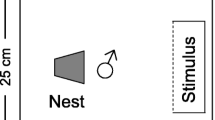Abstract
Aggression among individuals which compete for resources such as food or territory, or to establish dominance relationships, can cause injuries that may be risky for the contenders. In this way, individuals of many species have strategies to resolve conflicts reducing levels of aggression. Thus, if individuals are able to recognize each other and remember previous agonistic experiences and the result of the fight, they will resolve the subsequent encounter with lower levels of aggression. Here, we evaluated the effect of previous fighting experiences (24 h interval) on agonistic behaviors of subsequent encounters in zebrafish (Danio rerio) males. Specifically, we examined if any reduction in aggression is because of an individual's ability to remember other individuals from previous interactions, or if reductions come directly from winning or losing a fight. We found that when a pair of opponents (of the same size) had fought, and 24 h later the same dyad fought again, the number of bites decreases 85% and the duration of aggression decreases 73% in the second encounter, and this effect persisted in a third encounter (a decrease of 90% and 95%, respectively). To evaluate if the effect of previous experience on agonistic behaviors depended on facing the same opponent, in the second fight of a new experiment the opponent was changed. In this case, no decreases in the number of bites or in the duration of aggression was observed. In conclusion, pairs of zebrafish males resolve a conflict with lower levels of aggression when having previously fought with that particular opponent, but not with an unknown opponent. As a whole, these results suggest that zebrafish males are capable of recognizing the opponent, remembering previous experiences and changing their fighting strategies accordingly, but not only as a consequence of the result of a previous encounter.







Similar content being viewed by others
References
Adamo SA, Hoy RR (1995) Agonistic behaviour in male and female field crickets, Gryllus bimaculatus, and how behavioural context influences its expression. Anim Behav 49(6):1491–1501
Avdesh A, Chen M, Martin-Iverson MT, Mondal A, Ong D, Rainey-Smith S et al (2012) Regular care and maintenance of a zebrafish (Danio rerio) laboratory: an introduction. JoVE 69:e4196
Bruce M, Doherty T, Kaplan J, Sutherland C, Atema J (2018) American lobsters, Homarus americanus, use vision for initial opponent evaluation and subsequent memory. Bull Mar Sci 94(3):517–532
Chou MY, Amo R, Kinoshita M, Cherng BW, Shimazaki H, Agetsuma M et al (2016) Social conflict resolution regulated by two dorsal habenular subregions in zebrafish. Science 352(6281):87–90
Clutton-Brock TH, Albon SD (1979) The roaring of red deer and the evolution of honest advertisement. Behaviour 69(3–4):145–170
Davies NB, Halliday TR (1978) Deep croaks and fighting assessment in toads Bufo. Nature 274(5672):683
Enquist M, Leimar O (1990) The evolution of fatal fighting. Anim Behav 39(1):1–9
Hsu Y, Earley RL, Wolf LL (2006) Modulation of aggressive behaviour by fighting experience: mechanisms and contest outcomes. Biol Rev 81(1):33–74
Johnsson JI (1997) Individual recognition affects aggression and dominance relations in rainbow trout, Oncorhynchus mykiss. Ethology 103(4):267–282
Kalueff AV, Gebhardt M, Stewart AM, Cachat JM, Brimmer M, Chawla JS et al (2013) Towards a comprehensive catalog of zebrafish behavior 1.0 and beyond. Zebrafish 10(1):70–86
Karino K, Someya C (2007) The influence of sex, line, and fight experience on aggressiveness of the Siamese fighting fish in intrasexual competition. Behav Process 75(3):283–289
Lehner SR, Rutte C, Taborsky M (2011) Rats benefit from winner and loser effects. Ethology 117(11):949–960
López P, Martín J (2001) Fighting rules and rival recognition reduce costs of aggression in male lizards, Podarcis hispanica. Behav Eco Sociobiol 49(2–3):111–116
Madeira N, Oliveira RF (2017) Long-term social recognition memory in zebrafish. Zebrafish 14(4):305–310
Martinez M, Salvador A, Simón VM (1994) Behavioral changes over several successful agonistic encounters between male mice: effects of type of “standard opponent”. Aggress Behav 20(6):441–451
Maynard Smith J, Price GR (1973) The logic of animal conflict. Nature 246(5427):15
McElligott AG, Mattiangeli V, Mattiello S, Verga M, Reynolds CA, Hayden TJ (1998) Fighting tactics of fallow bucks (Dama, Cervidae): reducing the risks of serious conflict. Ethology 104(9):789–803
Oliveira RF, Silva JF, Simoes JM (2011) Fighting zebrafish: characterization of aggressive behavior and winner–loser effects. Zebrafish 8(2):73–81
Paull GC, Filby AL, Giddins HG, Coe TS, Hamilton PB, Tyler CR (2010) Dominance hierarchies in zebrafish (Danio rerio) and their relationship with reproductive success. Zebrafish 7(1):109–117
Acknowledgements
Fundings were provided by the following Grants: PICT-2016/0086 (Agencia de Promoción Científica y Técnica), UBACyT 2016/0038 (Universidad de Buenos Aires).
Author information
Authors and Affiliations
Corresponding author
Ethics declarations
Conflict of interest
No competing financial interests exist.
Additional information
Publisher's Note
Springer Nature remains neutral with regard to jurisdictional claims in published maps and institutional affiliations.
Rights and permissions
About this article
Cite this article
Cavallino, L., Dramis, A., Pedreira, M.E. et al. Effect of previous fighting on the dynamic of agonistic encounters in zebrafish males. Anim Cogn 23, 999–1006 (2020). https://doi.org/10.1007/s10071-020-01408-w
Received:
Revised:
Accepted:
Published:
Issue Date:
DOI: https://doi.org/10.1007/s10071-020-01408-w




